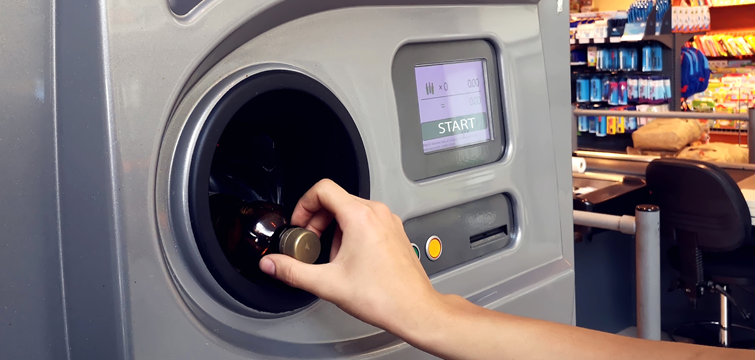At the end of 2015, the European Commission released their revised Circular Economy Package.
Included were first draft proposals for changes to a number of directives including the Waste Framework, landfilling, end-of-life vehicles, packaging, WEEE and batteries. Due to Brexit it is not yet certain how these amendments could impact or influence the UK waste regulations.
The key elements of the revised proposal includes:
- A common EU target for recycling 65% of municipal waste by 2030
- A common EU target for recycling 75% of packaging waste by 2030
- A binding landfill target to reduce landfill to maximum of 10% of all waste by 2030
- A ban on landfilling of separately collected waste
- Economic incentives for producers to put greener products on the market
Find out more about the Circular Economy Package in this video by the European Commission's Directorate General for the Environment.
The Ordinary Legislative Procedure (previously known as the Co-Decision Procedure) gives stakeholders the opportunity to make their voices and opinions heard on directives and regulations, and many different groups such as the EC committee, The European Organisation for Packaging and the Environment (EUROPEN), Advisory Committee on Packaging (ACP), plus approximately 1,500 participants through an online survey, were able to release their views and suggestions.
Commitment to fulfilling an action plan
The rapporteur of the EC Parliament committee, Simona Bonafè published her draft report on the Circular Economy Package in May 2016 and voiced the views of the MEPS during the trilogue earlier this year.
Despite the improvements from the previous Circular Economy Package rejected in mid-2015, many MEPs were unhappy with the less ambitious nature of the new version compared to the withdrawn resolution, primarily as this saw slightly lower targets. As such Bonafè proposed in her draft report that the targets suggested by the Commission should be set higher, for example a 5% increase on the 2030 recycling target for municipal waste.
In addition, she has added that textiles and bio-waste should be collected as separate regulated waste streams and that all waste streams should have an incineration ban.
Opposition to restrictive packaging requirements
More recently in August 2016, EUROPEN, who represents the interests of big brand names such as Coca-Cola, Danone, Heineken, and Mars, released their joint statement on the legislative review, particularly focusing on packaging.
They agreed with the importance of a circular economy when it comes to packaging, believing that the packaging chain needs to be considered in its entirety. However, they were strongly against measures that set restrictive requirements on packaging characteristics such as recyclable vs non-recyclable, bio-based vs biodegradable, and single-use vs multi-use.
The likes of this eco-modulation has already been used in France since 2012, seeing an increased focus on Design for Environment (DfE) in producers, particularly in packaging. However, as this has only recently been implemented, and is not widely used across Europe, it is hard to tell if it has made, or will make, a significant impact.
The economic incentives for DfE were always considered to be one of the main objectives of Extended Producer Responsibility, and the Circular Economy Package is aiming to strengthen waste prevention, which relies heavily on DfE processes such as design for disassembly and modular design.
Avoidance of divergent design measures
It is likely that the EUROPEN view on eco-modulation is due to their Internal Market suggestions where they ‘recommend avoiding measures that could lead to divergent national packaging design requirements, since they create de facto trade barriers for all packaged goods’. This opens up the view that divergent design measures across member states could lead to a disturbance in the single market, which currently needs harmonisation to ensure equal access for producers.
Similarly, EUROPEN suggests that the basis of costs over member states should be based on harmonised criteria, as currently obligated costs for producers are not clearly distinguished and differ vastly over the EU.
Regarding the packaging prevention requirements, their opinion is that this should be kept separate from EPR as they believe that producers need to drive waste prevention as they know what packaging is best for their product – the prevention of waste is related to the life-cycle of the entire product more than the end-of-life responsibilities of a producer.
The choice of packaging for a specific function and any restrictive requirements should be made on a case-by-case basis and should consider the significance of the products in which the packaging contains.
UK support for a Circular Economy
The Advisory Committee on Packaging (APC) is made up for a mixture of UK producers (under the packaging producer responsibility obligations), local authorities, compliance schemes, waste management companies, reprocessors and exporters.
Together they give recommendations to the government to assist policy development with an overarching aim to maximise economic, environmental and social benefits of reuse, recycling and recovery of packaging waste with applicable EU requirements. Again, the APC’s focus was packaging and their stance had a strong focus on resource efficiency. They ‘strongly support the concept of the Circular Economy’ and think that the PRN system should remain in the UK.
In terms of the importance of considering packaging functions, their views mirror those of the EUROPEN. The ACP believe that the ‘vital role that packaging plays in prolonging product life’, such as food, means that they need to ensure that the targets proposed do not ‘compromise the effectiveness of the packaging in its primary role’.
Additionally, they stated that it is essential to perform an impact study to assess an eco-efficient level of recycling, as with more recycling comes a greater demand to use more energy and water for sorting and washing. The group want resource efficiency to be recognised as an ‘essential element’ and therefore to be clearly defined within the circular economy going forward.
Final vote delays
Two committees have reviewed the legislation proposals, the Industry, Research and Energy (ITRE) and Environment, Public Health and Food and Safety (ENVI). Overall, over 2000 amendments have been listed alongside Bonafès draft report.
The final vote from the ENVI was recently postponed to January 2017 as announced by Bonafè at the live panel debate on the Circular Economy package; the delay likely due to the many amendments proposed by MEPs.
Originally the plan was to have the position of the Commission and parliament stated by 2017 for the law to be enforced in 2019. However, because of the delay, this had to be pushed back also. Watch this space for an update on the impacts of these finalisations.
Whether you are a producer, reprocessor or a recycling enthusiast, let us know your opinions in the comment box below.
If you have any questions about your EU compliance requirements, get in touch with our specialists by calling 0845 094 2228 or emailing info@ecosurety.com.

Kimberley Day
Account manager
Kimberley works closely with our members in her role as an account manager, working hard to ensure they have everything in order to comply with their obligations. Having graduated from the University of Exeter with a Bachelor of Science in Biological and Medicinal Chemistry, Kimberley is without a doubt highly experienced dealing with technical intricacies and processes!

Useful links
The UK does not yet have comprehensive EPR systems in place, but that is set to change. Are you ready?
Read More >>The online Report Packaging Data portal is now live for large producers to complete enrolment and nominate their compliance scheme by 1 October.
Read More >>The ZAP project, funded by the Ecosurety Exploration Fund, was launched by the Alliance for Sustainable Development (ASBP) to help reduce the quantity of avoidable packaging plastic waste in construction, much of which is not recycled.
Read More >>Latest News

Draft packaging EPR regulations sent to European Union and World Trade Organisation
By Louise Shellard 02 May 2024
European Parliament introduce regulations to improve packaging sustainability
By Louise Shellard 30 Apr 2024
Q1 2024 recycling data reveals good performance in most materials
By Nigel Ransom 29 Apr 2024
